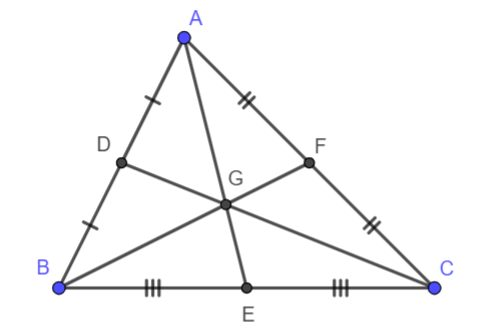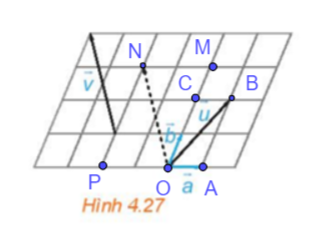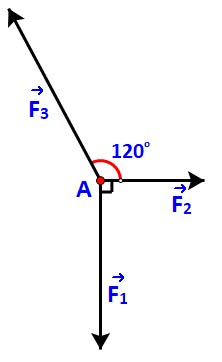Toán 10 Bài 9: Tích của một vectơ với một số Giải SGK Toán 10 trang 58, 59 - Tập 1 sách Kết nối tri thức với cuộc sống
Toán 10 Bài 9 Kết nối tri thức trang 58, 59 giúp các bạn học sinh có thêm nhiều gợi ý tham khảo để trả lời các câu hỏi phần luyện tập và 5 bài tập trong SGK bài Tích của một vectơ với một số thuộc chương 4 Vectơ.
Giải Toán 10 Kết nối tri thức Bài 9 trang 58, 59 được biên soạn với các lời giải chi tiết, đầy đủ và chính xác bám sát chương trình sách giáo khoa môn Toán 10 tập 1. Giải Toán 10 Bài 9 Kết nối tri thức là tài liệu cực kì hữu ích hỗ trợ các em học sinh lớp 10 trong quá trình giải bài tập. Đồng thời phụ huynh có thể sử dụng để hướng dẫn con em học tập và đổi mới phương pháp giải phù hợp hơn.
Toán 10 Bài 9: Tích của một vectơ với một số
Luyện tập Toán 10 Bài 9 Kết nối tri thức
Luyện tập 2
Cho tam giác ABC có trọng tâm G. Chứng minh rằng với điểm O tùy ý, ta có:
![]() \(\overrightarrow {OA} + \overrightarrow {OB} + \overrightarrow {OC} = 3.\overrightarrow {OG}\)
\(\overrightarrow {OA} + \overrightarrow {OB} + \overrightarrow {OC} = 3.\overrightarrow {OG}\)
Gợi ý đáp án
Hình vẽ minh họa:

Ta có:
 \(\begin{matrix}
\overrightarrow {OA} + \overrightarrow {OB} + \overrightarrow {OC} \hfill \\
= \overrightarrow {OG} + \overrightarrow {GA} + \overrightarrow {OG} + \overrightarrow {GB} + \overrightarrow {OG} + \overrightarrow {GC} \hfill \\
= 3\overrightarrow {OG} + \left( {\overrightarrow {GA} + \overrightarrow {GB} + \overrightarrow {GC} } \right) \hfill \\
\end{matrix}\)
\(\begin{matrix}
\overrightarrow {OA} + \overrightarrow {OB} + \overrightarrow {OC} \hfill \\
= \overrightarrow {OG} + \overrightarrow {GA} + \overrightarrow {OG} + \overrightarrow {GB} + \overrightarrow {OG} + \overrightarrow {GC} \hfill \\
= 3\overrightarrow {OG} + \left( {\overrightarrow {GA} + \overrightarrow {GB} + \overrightarrow {GC} } \right) \hfill \\
\end{matrix}\)
Do G là trọng tâm tam giác ABC => ![]() \(\overrightarrow {GA} + \overrightarrow {GB} + \overrightarrow {GC} = \overrightarrow 0\)
\(\overrightarrow {GA} + \overrightarrow {GB} + \overrightarrow {GC} = \overrightarrow 0\)
=> ![]() \(\overrightarrow {OA} + \overrightarrow {OB} + \overrightarrow {OC} = 3.\overrightarrow {OG}\)
\(\overrightarrow {OA} + \overrightarrow {OB} + \overrightarrow {OC} = 3.\overrightarrow {OG}\)
Luyện tập 3
Trong hình 4.27, hãy biểu thị mỗi vecto ![]() \(\overrightarrow u ;\overrightarrow v\) theo hai vecto
\(\overrightarrow u ;\overrightarrow v\) theo hai vecto ![]() \(\overrightarrow a ;\overrightarrow b\) , tức là tìm các số x, y, z, t để
\(\overrightarrow a ;\overrightarrow b\) , tức là tìm các số x, y, z, t để ![]() \(\overrightarrow u = x.\overrightarrow a + y\overrightarrow b ;\overrightarrow v = t\overrightarrow a + z\overrightarrow b\)
\(\overrightarrow u = x.\overrightarrow a + y\overrightarrow b ;\overrightarrow v = t\overrightarrow a + z\overrightarrow b\)
Gợi ý đáp án
Hình vẽ minh họa:

Xét hình bình hành OABC ta có:
![]() \(\overrightarrow {OA} = \overrightarrow a ;\overrightarrow {OB} = 2\overrightarrow b ;\overrightarrow {OB} = \overrightarrow u\)
\(\overrightarrow {OA} = \overrightarrow a ;\overrightarrow {OB} = 2\overrightarrow b ;\overrightarrow {OB} = \overrightarrow u\)
Khi đó ta có:
![]() \(\overrightarrow u = \overrightarrow {OB} = \overrightarrow {OA} + \overrightarrow {OC} = \overrightarrow a + 2.\overrightarrow b\)(Quy tắc hình bình hành)
\(\overrightarrow u = \overrightarrow {OB} = \overrightarrow {OA} + \overrightarrow {OC} = \overrightarrow a + 2.\overrightarrow b\)(Quy tắc hình bình hành)
Xét hình bình hành OMNP ta có:
![]() \(\overrightarrow {ON} = \overrightarrow v ;\overrightarrow {OM} = 3\overrightarrow b ;\overrightarrow {OP} = - 2\overrightarrow a\)
\(\overrightarrow {ON} = \overrightarrow v ;\overrightarrow {OM} = 3\overrightarrow b ;\overrightarrow {OP} = - 2\overrightarrow a\)
Khi đó ta có:
![]() \(\overrightarrow v = \overrightarrow {ON} = \overrightarrow {OM} + \overrightarrow {OP} = 3\overrightarrow b - 2\overrightarrow a = - 2\overrightarrow a + 3\overrightarrow b\)
\(\overrightarrow v = \overrightarrow {ON} = \overrightarrow {OM} + \overrightarrow {OP} = 3\overrightarrow b - 2\overrightarrow a = - 2\overrightarrow a + 3\overrightarrow b\)
Vậy ![]() \(\overrightarrow u = \overrightarrow a + 2\overrightarrow b ;\overrightarrow v = - 2\overrightarrow a + 3\overrightarrow b\)
\(\overrightarrow u = \overrightarrow a + 2\overrightarrow b ;\overrightarrow v = - 2\overrightarrow a + 3\overrightarrow b\)
Giải Toán 10 trang 58, 59 Kết nối tri thức tập 1
Bài 4.11 trang 58
Cho hình bình hành ABCD. Gọi M là trung điểm của cạnh BC. Hãy biểu thị ![]() \(\overrightarrow {AM}\)theo hai vecto
\(\overrightarrow {AM}\)theo hai vecto ![]() \(\overrightarrow {AB}\)và
\(\overrightarrow {AB}\)và ![]() \(\overrightarrow {AD} .\)
\(\overrightarrow {AD} .\)
Gợi ý đáp án
Học sinh tự vẽ hình
Từ M kẻ đường thẳng song song với AB, cắt AD tại E.
Khi đó tứ giác ABME là hình bình hành.
Do đó: ![]() \(\overrightarrow {AM} = \overrightarrow {AB} + \overrightarrow {AE} .\)
\(\overrightarrow {AM} = \overrightarrow {AB} + \overrightarrow {AE} .\)
Dễ thấy: ![]() \(AE = BM = \frac{1}{2}BC = \frac{1}{2}AD\)
\(AE = BM = \frac{1}{2}BC = \frac{1}{2}AD\)
![]() \(\Rightarrow \overrightarrow {AE} = \frac{1}{2}\overrightarrow {AD}\)
\(\Rightarrow \overrightarrow {AE} = \frac{1}{2}\overrightarrow {AD}\)
![]() \(\Rightarrow \overrightarrow {AM} = \overrightarrow {AB} + \frac{1}{2}\overrightarrow {AD}\)
\(\Rightarrow \overrightarrow {AM} = \overrightarrow {AB} + \frac{1}{2}\overrightarrow {AD}\)
Vậy ![]() \(\overrightarrow {AM} = \overrightarrow {AB} + \frac{1}{2}\overrightarrow {AD}\)
\(\overrightarrow {AM} = \overrightarrow {AB} + \frac{1}{2}\overrightarrow {AD}\)
Bài 4.12 trang 58
Cho tứ giác ABCD. Gọi M, N tương ứng là trung điểm của các cạnh AB, CD. Chứng minh ![]() \(\overrightarrow {BC} + \overrightarrow {AD} = 2\overrightarrow {MN} = \;\overrightarrow {AC} + \overrightarrow {BD} .\)
\(\overrightarrow {BC} + \overrightarrow {AD} = 2\overrightarrow {MN} = \;\overrightarrow {AC} + \overrightarrow {BD} .\)
Gợi ý đáp án
Ta có:
![]() \(\overrightarrow {MN} = \overrightarrow {MA} + \overrightarrow {AD} + \overrightarrow {DN}\)
\(\overrightarrow {MN} = \overrightarrow {MA} + \overrightarrow {AD} + \overrightarrow {DN}\)
Mặt khác: ![]() \(\overrightarrow {MN} = \overrightarrow {MB} + \overrightarrow {BC} + \overrightarrow {CN}\)
\(\overrightarrow {MN} = \overrightarrow {MB} + \overrightarrow {BC} + \overrightarrow {CN}\)
 \(\begin{array}{l} \Rightarrow 2\overrightarrow {MN} = \overrightarrow {MA} + \overrightarrow {AD} + \overrightarrow {DN} + \overrightarrow {MB} + \overrightarrow {BC} + \overrightarrow {CN} \\ \Leftrightarrow 2\overrightarrow {MN} = \left( {\overrightarrow {MA} + \overrightarrow {MB} } \right) + \left( {\overrightarrow {DN} + \overrightarrow {CN} } \right) + \overrightarrow {BC} + \overrightarrow {AD} \\ \Leftrightarrow 2\overrightarrow {MN} = \overrightarrow 0 + \overrightarrow 0 + \overrightarrow {BC} + \overrightarrow {AD} \\ \Leftrightarrow 2\overrightarrow {MN} = \overrightarrow {BC} + \overrightarrow {AD} \end{array}\)
\(\begin{array}{l} \Rightarrow 2\overrightarrow {MN} = \overrightarrow {MA} + \overrightarrow {AD} + \overrightarrow {DN} + \overrightarrow {MB} + \overrightarrow {BC} + \overrightarrow {CN} \\ \Leftrightarrow 2\overrightarrow {MN} = \left( {\overrightarrow {MA} + \overrightarrow {MB} } \right) + \left( {\overrightarrow {DN} + \overrightarrow {CN} } \right) + \overrightarrow {BC} + \overrightarrow {AD} \\ \Leftrightarrow 2\overrightarrow {MN} = \overrightarrow 0 + \overrightarrow 0 + \overrightarrow {BC} + \overrightarrow {AD} \\ \Leftrightarrow 2\overrightarrow {MN} = \overrightarrow {BC} + \overrightarrow {AD} \end{array}\)
Tương tự ta cũng có:
 \(\left\{ \begin{array}{l}\overrightarrow {MN} = \overrightarrow {MA} + \overrightarrow {AC} + \overrightarrow {CN} \\\overrightarrow {MN} = \overrightarrow {MB} + \overrightarrow {BD} + \overrightarrow {DN} \end{array} \right.\)
\(\left\{ \begin{array}{l}\overrightarrow {MN} = \overrightarrow {MA} + \overrightarrow {AC} + \overrightarrow {CN} \\\overrightarrow {MN} = \overrightarrow {MB} + \overrightarrow {BD} + \overrightarrow {DN} \end{array} \right.\)
 \(\begin{array}{l} \Rightarrow 2\overrightarrow {MN} = \overrightarrow {MA} + \overrightarrow {AC} + \overrightarrow {CN} + \overrightarrow {MB} + \overrightarrow {BD} + \overrightarrow {DN} \\ \Leftrightarrow 2\overrightarrow {MN} = \left( {\overrightarrow {MA} + \overrightarrow {MB} } \right) + \left( {\overrightarrow {CN} + \overrightarrow {DN} } \right) + \overrightarrow {AC} + \overrightarrow {BD} \\ \Leftrightarrow 2\overrightarrow {MN} = \overrightarrow 0 + \overrightarrow 0 + \overrightarrow {AC} + \overrightarrow {BD} \\ \Leftrightarrow 2\overrightarrow {MN} = \overrightarrow {AC} + \overrightarrow {BD} \end{array}\)
\(\begin{array}{l} \Rightarrow 2\overrightarrow {MN} = \overrightarrow {MA} + \overrightarrow {AC} + \overrightarrow {CN} + \overrightarrow {MB} + \overrightarrow {BD} + \overrightarrow {DN} \\ \Leftrightarrow 2\overrightarrow {MN} = \left( {\overrightarrow {MA} + \overrightarrow {MB} } \right) + \left( {\overrightarrow {CN} + \overrightarrow {DN} } \right) + \overrightarrow {AC} + \overrightarrow {BD} \\ \Leftrightarrow 2\overrightarrow {MN} = \overrightarrow 0 + \overrightarrow 0 + \overrightarrow {AC} + \overrightarrow {BD} \\ \Leftrightarrow 2\overrightarrow {MN} = \overrightarrow {AC} + \overrightarrow {BD} \end{array}\)
Vậy ![]() \(\overrightarrow {BC} + \overrightarrow {AD} = 2\overrightarrow {MN} = \;\overrightarrow {AC} + \overrightarrow {BD} .\)
\(\overrightarrow {BC} + \overrightarrow {AD} = 2\overrightarrow {MN} = \;\overrightarrow {AC} + \overrightarrow {BD} .\)
Bài 4.13 trang 58
Cho hai điểm phân biệt A và B.
a) Hãy xác định điểm K sao cho ![]() \(\overrightarrow {KA} + 2\overrightarrow {KB} = \overrightarrow 0 .\)
\(\overrightarrow {KA} + 2\overrightarrow {KB} = \overrightarrow 0 .\)
b) Chứng minh rằng với mọi điểm O, ta có ![]() \(\overrightarrow {OK} = \frac{1}{3}\overrightarrow {OA} + \frac{2}{3}\overrightarrow {OB} .\)
\(\overrightarrow {OK} = \frac{1}{3}\overrightarrow {OA} + \frac{2}{3}\overrightarrow {OB} .\)
Gợi ý đáp án
a)
Ta có: ![]() \(\overrightarrow {KA} + 2\overrightarrow {KB} = \overrightarrow 0 .\)
\(\overrightarrow {KA} + 2\overrightarrow {KB} = \overrightarrow 0 .\)
![]() \(\Leftrightarrow \overrightarrow {KA} = - 2\overrightarrow {KB}\)
\(\Leftrightarrow \overrightarrow {KA} = - 2\overrightarrow {KB}\)
Suy ra vectơ ![]() \(\overrightarrow {KA} và vecto\;\overrightarrow {KB}\) cùng phương, ngược chiều và KA = 2.KB
\(\overrightarrow {KA} và vecto\;\overrightarrow {KB}\) cùng phương, ngược chiều và KA = 2.KB
\Rightarrow K,A,Bthẳng hàng, K nằm giữa A và B thỏa mãn: KA = 2.KB
Bài 4.14 trang 58
Cho tam giác ABC
a) Hãy xác định điểm M để ![]() \(\overrightarrow {MA} + \overrightarrow {MB} + 2\overrightarrow {MC} = \overrightarrow 0\)
\(\overrightarrow {MA} + \overrightarrow {MB} + 2\overrightarrow {MC} = \overrightarrow 0\)
b) Chứng minh rằng với mọi điểm O, ta có ![]() \(\overrightarrow {OA} + \overrightarrow {OB} + 2\overrightarrow {OC} = 4\overrightarrow {OM}\)
\(\overrightarrow {OA} + \overrightarrow {OB} + 2\overrightarrow {OC} = 4\overrightarrow {OM}\)
Gợi ý đáp án
a) Ta có:
![]() \(\overrightarrow {MA} + \overrightarrow {MB} + 2\overrightarrow {MC} = \overrightarrow 0 \Leftrightarrow \overrightarrow {MA} + \left( {\overrightarrow {MA} + \overrightarrow {AB} } \right) + 2\left( {\overrightarrow {MA} + \overrightarrow {AC} } \right) = \overrightarrow 0\)
\(\overrightarrow {MA} + \overrightarrow {MB} + 2\overrightarrow {MC} = \overrightarrow 0 \Leftrightarrow \overrightarrow {MA} + \left( {\overrightarrow {MA} + \overrightarrow {AB} } \right) + 2\left( {\overrightarrow {MA} + \overrightarrow {AC} } \right) = \overrightarrow 0\)
 \(\begin{array}{l} \Leftrightarrow \overrightarrow {MA} + \left( {\overrightarrow {MA} + \overrightarrow {AB} } \right) + 2\left( {\overrightarrow {MA} + \overrightarrow {AC} } \right) = \overrightarrow 0 \\ \Leftrightarrow 4\overrightarrow {MA} + \overrightarrow {AB} + 2\overrightarrow {AC} = \overrightarrow 0 \\ \Leftrightarrow 4\overrightarrow {AM} = \overrightarrow {AB} + 2\overrightarrow {AC} \\ \Leftrightarrow \overrightarrow {AM} = \frac{1}{4}\overrightarrow {AB} + \frac{1}{2}\overrightarrow {AC} \end{array}\)
\(\begin{array}{l} \Leftrightarrow \overrightarrow {MA} + \left( {\overrightarrow {MA} + \overrightarrow {AB} } \right) + 2\left( {\overrightarrow {MA} + \overrightarrow {AC} } \right) = \overrightarrow 0 \\ \Leftrightarrow 4\overrightarrow {MA} + \overrightarrow {AB} + 2\overrightarrow {AC} = \overrightarrow 0 \\ \Leftrightarrow 4\overrightarrow {AM} = \overrightarrow {AB} + 2\overrightarrow {AC} \\ \Leftrightarrow \overrightarrow {AM} = \frac{1}{4}\overrightarrow {AB} + \frac{1}{2}\overrightarrow {AC} \end{array}\)
Trên cạnh AB, AC lấy điểm D, E sao cho ![]() \(AD = \frac{1}{4}AB;\;\,AE = \frac{1}{2}AC\)
\(AD = \frac{1}{4}AB;\;\,AE = \frac{1}{2}AC\)
Khi đó ![]() \(\overrightarrow {AM} = \overrightarrow {AD} + \overrightarrow {AE}\)hay M là đỉnh thứ tư của hình bình hành AEMD.
\(\overrightarrow {AM} = \overrightarrow {AD} + \overrightarrow {AE}\)hay M là đỉnh thứ tư của hình bình hành AEMD.
Bài 4.15 trang 59
Chất điểm A chịu tác động của ba lực ![]() \(\overrightarrow {{F_1}} ,\;\overrightarrow {{F_2}} ,\;\overrightarrow {{F_3}}\) như hình 4.30 và ở trạng thái cân bằng (tức là
\(\overrightarrow {{F_1}} ,\;\overrightarrow {{F_2}} ,\;\overrightarrow {{F_3}}\) như hình 4.30 và ở trạng thái cân bằng (tức là ![]() \(\overrightarrow {{F_1}} + \;\overrightarrow {{F_2}} + \;\overrightarrow {{F_3}} = \overrightarrow 0 )\). Tính độ lớn của các lực
\(\overrightarrow {{F_1}} + \;\overrightarrow {{F_2}} + \;\overrightarrow {{F_3}} = \overrightarrow 0 )\). Tính độ lớn của các lực ![]() \(\overrightarrow {{F_2}} ,\;\overrightarrow {{F_3}} biết \overrightarrow {{F_1}}\) có độ lớn là 20N.
\(\overrightarrow {{F_2}} ,\;\overrightarrow {{F_3}} biết \overrightarrow {{F_1}}\) có độ lớn là 20N.

Gợi ý đáp án
Bước 1: Đặt ![]() \(\overrightarrow u = \overrightarrow {{F_1}} + \;\overrightarrow {{F_2}}\). Ta xác định các điểm như hình dưới.
\(\overrightarrow u = \overrightarrow {{F_1}} + \;\overrightarrow {{F_2}}\). Ta xác định các điểm như hình dưới.
Dễ dàng xác định điểm C, là điểm thứ tư của hình bình hành ABCD. Do đó vecto ![]() \(\overrightarrow u\) chính là vectơ
\(\overrightarrow u\) chính là vectơ ![]() \(\overrightarrow {AC}\)
\(\overrightarrow {AC}\)
Vì chất điểm A ở trang thái cân bằng nên ![]() \(\overrightarrow {{F_1}} + \;\overrightarrow {{F_2}} + \;\overrightarrow {{F_3}} = \overrightarrow 0\)hay
\(\overrightarrow {{F_1}} + \;\overrightarrow {{F_2}} + \;\overrightarrow {{F_3}} = \overrightarrow 0\)hay ![]() \(\;\overrightarrow u + \;\overrightarrow {{F_3}} = \overrightarrow 0\)
\(\;\overrightarrow u + \;\overrightarrow {{F_3}} = \overrightarrow 0\)
![]() \(\Leftrightarrow \;\overrightarrow u và \;\overrightarrow {{F_3}}\) là hai vecto đối nhau.
\(\Leftrightarrow \;\overrightarrow u và \;\overrightarrow {{F_3}}\) là hai vecto đối nhau.
![]() \(\Leftrightarrow A\) là trung điểm của EC.
\(\Leftrightarrow A\) là trung điểm của EC.
Bước 2:
Ta có:![]() \(\left| {\overrightarrow {{F_1}} } \right| = AD = 20,\;\left| {\overrightarrow {{F_2}} } \right| = AB,\;\left| {\overrightarrow {{F_3}} } \right| = AC.\)
\(\left| {\overrightarrow {{F_1}} } \right| = AD = 20,\;\left| {\overrightarrow {{F_2}} } \right| = AB,\;\left| {\overrightarrow {{F_3}} } \right| = AC.\)
Do A, C, E thẳng hàng nên ![]() \(\widehat {CAB} = {180^o} - \widehat {EAB} = {60^o}\)
\(\widehat {CAB} = {180^o} - \widehat {EAB} = {60^o}\)
 \(\begin{array}{l} \Rightarrow \widehat {CAD} = {90^o} - {60^o} = {30^o}\\ \Rightarrow \left\{ \begin{array}{l}AC = \frac{{AD}}{{\cos {{30}^o}}} = \frac{{40\sqrt 3 }}{3};\;\\AB = DC = AC.\sin {30^o} = \frac{{20\sqrt 3 }}{3}.\end{array} \right.\end{array}\)
\(\begin{array}{l} \Rightarrow \widehat {CAD} = {90^o} - {60^o} = {30^o}\\ \Rightarrow \left\{ \begin{array}{l}AC = \frac{{AD}}{{\cos {{30}^o}}} = \frac{{40\sqrt 3 }}{3};\;\\AB = DC = AC.\sin {30^o} = \frac{{20\sqrt 3 }}{3}.\end{array} \right.\end{array}\)
Vậy ![]() \(\;\left| {\overrightarrow {{F_2}} } \right| = \frac{{20\sqrt 3 }}{3},\;\;\left| {\overrightarrow {{F_3}} } \right| = \frac{{40\sqrt 3 }}{3}.\)
\(\;\left| {\overrightarrow {{F_2}} } \right| = \frac{{20\sqrt 3 }}{3},\;\;\left| {\overrightarrow {{F_3}} } \right| = \frac{{40\sqrt 3 }}{3}.\)
Lý thuyết Tích của một vectơ với một số
1. Tích của vecto với một số
+) Tích của một vecto ![]() \(\overrightarrow a \ne \overrightarrow 0\)với một số thực k là một vecto, kí kiệu là
\(\overrightarrow a \ne \overrightarrow 0\)với một số thực k là một vecto, kí kiệu là ![]() \(k\overrightarrow a\).
\(k\overrightarrow a\).
+) Vecto ![]() \(k\overrightarrow a\)có độ dài bằng
\(k\overrightarrow a\)có độ dài bằng ![]() \(\left| k \right|\left| {\overrightarrow a } \right|\) và
\(\left| k \right|\left| {\overrightarrow a } \right|\) và
Cùng hướng với vecto ![]() \(\overrightarrow a\)nếu k > 0
\(\overrightarrow a\)nếu k > 0
Ngược hướng với vecto ![]() \(\overrightarrow a\)nếu k < 0
\(\overrightarrow a\)nếu k < 0
+) Quy ước:  \(k\overrightarrow a = \overrightarrow 0 \Leftrightarrow \left[ \begin{array}{l}\overrightarrow a = \overrightarrow 0 \\k = 0\end{array} \right.\)
\(k\overrightarrow a = \overrightarrow 0 \Leftrightarrow \left[ \begin{array}{l}\overrightarrow a = \overrightarrow 0 \\k = 0\end{array} \right.\)
Nhận xét: Hai vecto ![]() \(\overrightarrow a\)và
\(\overrightarrow a\)và ![]() \(\overrightarrow b\)cùng phương khi và chỉ khi tồn tại k để
\(\overrightarrow b\)cùng phương khi và chỉ khi tồn tại k để ![]() \(\overrightarrow a = k\overrightarrow b .\)
\(\overrightarrow a = k\overrightarrow b .\)
2. Các tính chất của phép nhân vecto với 1 số
+) Với hai vecto ![]() \(\overrightarrow a ,\overrightarrow b\)và hai số thực k,t ta luôn có:
\(\overrightarrow a ,\overrightarrow b\)và hai số thực k,t ta luôn có:
 \(\begin{array}{l}k(t\overrightarrow a ) = (kt)\;\overrightarrow a k + t)\,\overrightarrow a = k\overrightarrow a + t\overrightarrow a \\k(\overrightarrow a + \overrightarrow b ) = k\overrightarrow a + k\overrightarrow b ;\quad k(\overrightarrow a - \overrightarrow b ) = k\overrightarrow a - k\overrightarrow b \\1\;\overrightarrow a = \overrightarrow a ;\;\;( - 1)\;\overrightarrow a = - \,\overrightarrow a \end{array}\)
\(\begin{array}{l}k(t\overrightarrow a ) = (kt)\;\overrightarrow a k + t)\,\overrightarrow a = k\overrightarrow a + t\overrightarrow a \\k(\overrightarrow a + \overrightarrow b ) = k\overrightarrow a + k\overrightarrow b ;\quad k(\overrightarrow a - \overrightarrow b ) = k\overrightarrow a - k\overrightarrow b \\1\;\overrightarrow a = \overrightarrow a ;\;\;( - 1)\;\overrightarrow a = - \,\overrightarrow a \end{array}\)
+) Nhận xét:
I là trung điểm của ![]() \(AB \Leftrightarrow \overrightarrow {IA} + \overrightarrow {IB} = \overrightarrow 0\)
\(AB \Leftrightarrow \overrightarrow {IA} + \overrightarrow {IB} = \overrightarrow 0\)
G là trọng tâm ![]() \(\Delta ABC \Leftrightarrow \overrightarrow {GA} + \overrightarrow {GB} + \overrightarrow {GC} = \overrightarrow 0\)
\(\Delta ABC \Leftrightarrow \overrightarrow {GA} + \overrightarrow {GB} + \overrightarrow {GC} = \overrightarrow 0\)
Theo Nghị định 147/2024/ND-CP, bạn cần xác thực tài khoản trước khi sử dụng tính năng này. Chúng tôi sẽ gửi mã xác thực qua SMS hoặc Zalo tới số điện thoại mà bạn nhập dưới đây:












 Toán 10 Kết nối tri thức
Toán 10 Kết nối tri thức
 Toán 10 Chân trời sáng tạo
Toán 10 Chân trời sáng tạo
 Toán 10 Cánh Diều
Toán 10 Cánh Diều
 Soạn văn 10 Chân trời sáng tạo
Soạn văn 10 Chân trời sáng tạo
 Soạn văn 10 Cánh Diều
Soạn văn 10 Cánh Diều
 Soạn văn 10 Kết nối tri thức
Soạn văn 10 Kết nối tri thức
 Tiếng Anh 10 Global Success
Tiếng Anh 10 Global Success
 Tiếng anh 10 Friends Global
Tiếng anh 10 Friends Global
 Tiếng Anh 10 Explore New Worlds
Tiếng Anh 10 Explore New Worlds









